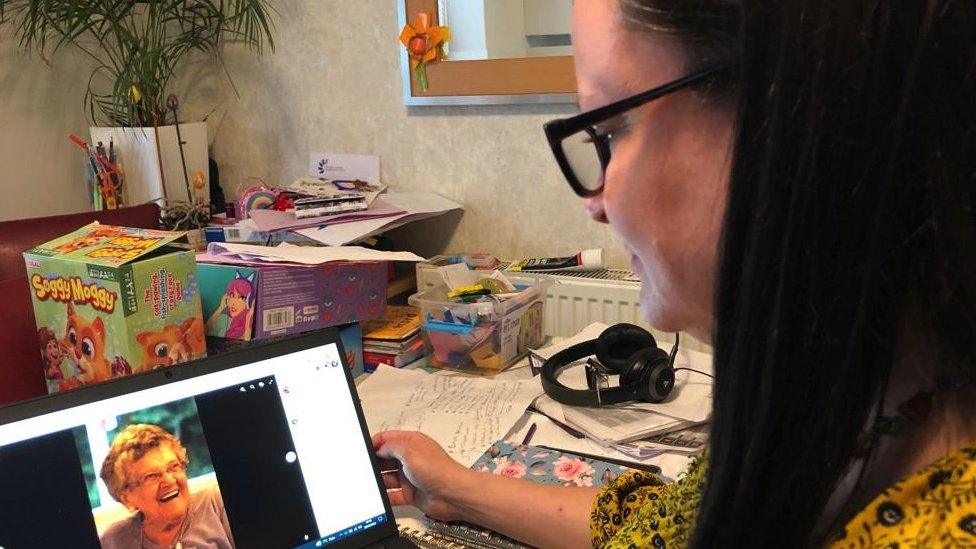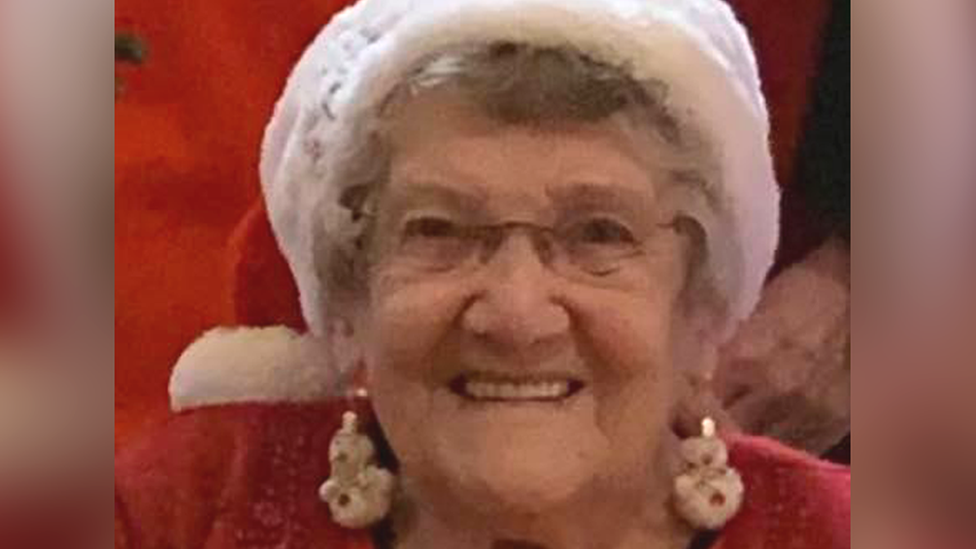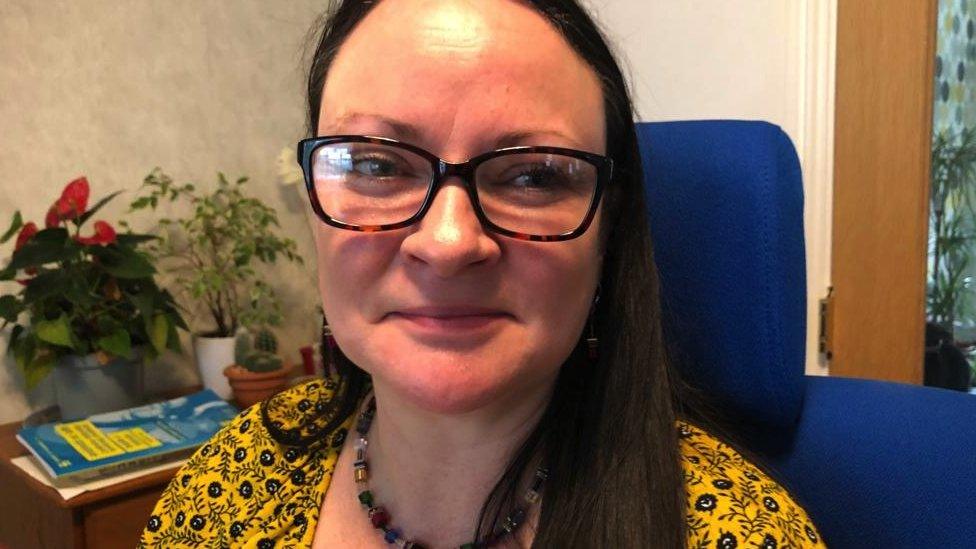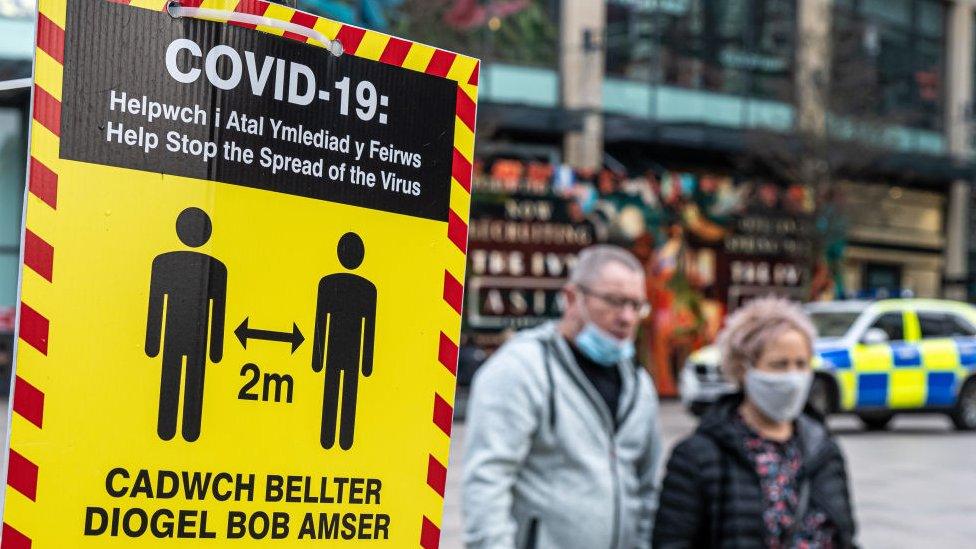Covid-19: 'We're traumatised by thought of Nan dying alone'
- Published
Pearl Higgins died in winter 2020 after being admitted to hospital
A woman has described the "painful experience" of losing three relatives who contracted Covid-19 in hospital.
Miranda Evans said being unable to be with her grandmother while she was in hospital left her family traumatised.
Some restrictions in hospitals had "many adverse effects" on patients' physical and mental health, a new report into the management of Covid-19 in hospitals in Wales has found.
The Welsh government said the findings would help improve services.
The interim report was produced by the National Nosocomial Covid-19 Programme, which was established by the Welsh government in April 2020.
Its aim is to support health organisations to investigate the safety implications of the high number of hospital-acquired Covid infections during the pandemic.
The report highlights "early lessons" following an assessment by NHS Wales of more than 5,000 "patient safety incidents", which occurred between March 2020 and April 2022.
Patient safety incidents are cases where one or more patients could have come to harm after catching Covid in healthcare settings.
'Extremely painful experience'

Miranda Evans was unable to visit or talk her grandmother after she was admitted to hospital
Miranda Evans, 44, from Bridgend, lost her grandmother, uncle and aunt to Covid-19, all of whom contracted the virus in hospital.
Ms Evans' grandmother, Pearl Higgins, 92, was admitted to hospital with a stroke in September 2020. Due to visiting restrictions, Ms Evans and her mother were unable to visit her.
"She was taken into hospital and we never saw her again. We were unable to see my grandmother. We were unable to speak to her," she revealed.
"There was very few people on hand to take calls for families. It was an extremely painful experience."
Ms Higgins was moved to four different wards, which made her family anxious about the prospect of her contracting Covid.
A few months into her stay, Ms Higgins tested positive for Covid and was moved to the Covid ward immediately. After a few days in the ward, she passed away.
Ms Evans and her family were unable to say their last goodbyes.

"No-one found us to say she was dying. We found out after she had died. It was extremely traumatising. We were all beside ourselves.
"A bomb went off in our family. Our hearts were just aching. We all felt numb.
"We had nightmares for months afterwards. My mum still has nightmares now. She dreams that my nan is lost in the hospital somewhere."
Ms Evans said she believed her grandmother may have survived if she had been able to see her family.

Miranda Evans lost three relatives to Covid-19, all of whom contracted it in hospital
"She just needed a familiar face. She needed someone, just one relative, and that could have been my mother who had been shielding with her for three months solidly."
She added: "Definitely valuable lessons to be learnt from this and for future pandemics, future emergencies, future diseases. So, we need to make sure that we're emergency planning now, you know, to make sure that we're catering for the needs of disabled people in their families."
What does the report say?
NHS visiting restrictions were introduced on several occasions to try to limit Covid transmission into hospital and protect vulnerable patients.
But the report says these restrictions had "many adverse effects on the physical and mental health of patients, especially those in vulnerable groups that the restrictions were intended to safeguard - who were not able to fully understand the decisions made".
"The limited alternative opportunities for making contact and communicating with loved ones, also negatively impacted the experience of other service users, families and carers," it says.
The report recommends all services and wards should have dedicated patients support teams to help families and carers having difficulty visiting loved ones.
The report makes it clear that the "scale of the pandemic" meant hospital patients "inevitably faced an increased risk", especially at times when the virus was spreading widely in communities.
The lack of testing capacity was a key problem during the early stages, it says.
"Demand exceeding capacity and the inability to test rapidly for Covid-19... meant that testing was somewhat ineffective as a mechanism for reducing infections, until the supply of consumables met demand and testing capacity increase," according to the report.
It also said infections could have spread more easily because patients had to be moved around cramped and, in some cases, outdated hospital buildings, hindering the hospitals' ability to isolate people.
The report recommends patients are seen "in the right place, at the right time", with any reasons for moving patients communicated quickly to their families.
Do not resuscitate decisions
"Do not attempt cardio-pulmonary resuscitation" (DNACPR) decisions are designed to protect people from unnecessary suffering caused by receiving resuscitation they do not want, will not work or where the harms outweigh the benefits.
But concerns emerged during the pandemic there was "a blanket approach" to their use along with a lack consultation with families.
The report says "the analysis did not identify evidence where DNACPR was used inappropriately" or not in keeping with Wales-wide policy.
However, it calls for better communication around "this sensitive subject", stressing families and carers need to be involved in the process as much as possible.
It says the roll-out of an electronic advanced care planning document would be a key improvement and alleviate potential issues.
Early lessons
The report identifies a number of further "early lessons", including the need for:
Quicker and more effective communication with staff about rapidly changing infection control guidance and procedures
More consistent approaches to the reporting of hospital-acquired infections across Wales, not just Covid
Requiring similar standards for investigating safety incidents to be introduced across all care settings not just "NHS-funded" care
The need to respond more effectively to families questions and concerns as incidents are being investigated
Better NHS support for bereaved families experiencing grief.
The National Nosocomial Covid-19 Programme will continue to work with Welsh health organisations to identify further lessons, with a final report scheduled for spring 2024.
So far the programme has looked at 5,000 of the "most complex" patient safety incidents where Covid was spread in hospitals. There are 18,000 cases in total to be assessed.
The interim report acknowledges that while its contents "may be upsetting for many... it is imperative that [it]... offers transparent insights that will lead to meaningful change".
However, it says the work does not "seek to detract" from the role of the UK Covid-19 Inquiry, which will likely hear evidence about the pandemic response in Wales along with the rest of the UK later this year.
Deputy Chief Medical Officer for Wales Chris Jones said: "The National Nosocomial Covid-19 Programme and Welsh government extend sincere condolences to those who lost loved ones after acquiring Covid-19 in healthcare settings.
"These findings provide an extremely valuable national insights that will improve the quality and safety of healthcare services in Wales."
Related topics
- Published30 November 2022

- Published20 August 2021

- Published28 May 2024
